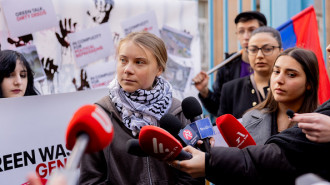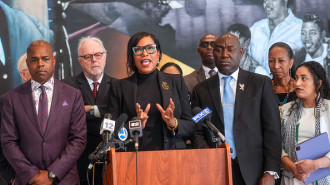United States and Russia fail to reach Syria deal
Top diplomats from the United States and Russia on Monday failed to reach a deal to ease fighting in Syria, US officials said, after government troops encircled rebel-held parts of Aleppo.
A senior State Department official said a fresh round of crisis talks between Secretary of State John Kerry and Russian Foreign Minister Sergei Lavrov on the margins of the G20 summit in China had ended without agreement.
Washington and Moscow support opposing sides in the five-year conflict, which has killed around 300,000 people and forced millions to flee.
A deal to provide aid to Aleppo's ravaged civilians and at least partially halt Russian and Syrian bombardments had looked likely on Sunday, before talks collapsed.
US officials accused Russia of backtracking on already agreed issues which Washington refused to revisit, but the talks seemed to have been overtaken by developments on the ground.
| Read more here: US, Russia preparing 'intelligence-sharing' deal over Syria's war-torn Aleppo Read more here: Russia 'walks back' on Syria deal with United States |
Syrian government troops renewed their siege of Aleppo on Sunday, with state media saying they had taken an area south of the city, severing the last opposition-held route into its eastern neighbourhoods.
Once Syria's economic powerhouse, Aleppo has been ravaged by the war that began with protests against President Bashar al-Assad's government in March 2011.
Presidents Barack Obama and Vladimir Putin also met Monday on the sidelines of the G20 summit in the Chinese city of Hangzhou, but it was far from clear that they would try to revive the talks.
The White House has been reluctant to tether Obama personally to a deal that could well fail.
Earlier truces in Syria have rapidly deteriorated, and Obama warned on Sunday that the US was approaching the talks "with some scepticism".
"Our conversations with the Russians are key because if it were not for the Russians, then Assad and the regime would not be able to sustain its offensive," he said, an acknowledgement that Putin, by sending troops and air assets to Syria, has made himself an indispensible player.
"But it is worth trying," Obama went on. "To the extent that there are children and women and innocent civilians who can get food and medical supplies and get some relief from the constant terror of bombings, that's worth the effort."
The White House is also highly reluctant to offer Putin a high-profile stage to gain international legitimacy after his backing for a regime that has used chemical weapons on civilians.
Obama has steadfastly refused to meet Putin for official talks, instead talking with him in "pull-asides" at closed multilateral meetings.
That was again the case at the G20.
"The President is taking part in a pull-aside with President Putin of Russia," said National Security Council spokesman Ned Price. "We expect to provide additional details of their discussion later today."
US officials had hoped to build pressure on Moscow over its support for Assad's government during the Hangzhou summit and upcoming UN General Assembly.
Washington has repeatedly said that Assad must step down in order for a lasting peace deal.
Turning up the heat in recent weeks, the White House has gone as far as to suggest Moscow is complicit in war crimes.
"You have the Assad regime which has been killing its own citizens with impunity, supported by the Russians and the Iranians," Obama said on Sunday.
Both Putin and Obama are expected to give press conferences later on Monday.
The failure to reach a deal is likely to heap pressure on Obama over his handling of the war in Syria.
Obama came to office vowing not to repeat the mistakes of his predecessor George W. Bush, who launched disastrous wars in Iraq and Afghanistan.
But as he prepares to leave office, critics say Obama's failure to intervene in Syria has had similarly bloody results, allowing the conflict to fester for years.









